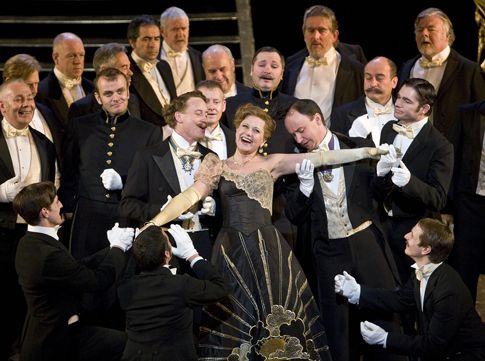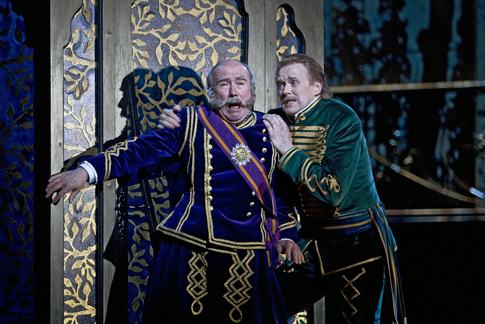![Fiona Murphy (Valencienne) & Alfie Boe (Camille de Rosillon) [Photo: Clive Barda courtesy of English National Opera]](http://www.operatoday.com/080423_0040widow.png)
27 May 2008
Merry Widow at ENO
In these days of 'concept' productions, it is rare that the curtain goes up on the first act of an opera and it looks exactly as one might reasonably expect it to.
I can still remember my first ever “Pelleas et Melisande” in my first ever outing at San Francisco Opera during my first ever visit to that beautiful town.
A recent visit to Berlin’s three opera houses yielded decidedly, nay wildly varying outcomes.
The Gotham Chamber Opera has been delighting opera fans on the Lower East Side for seven years now, one small audience at a time.
Thirty-six years after Sarah Caldwell and the Opera Company of Boston presented the first complete staged performances in the United States, Hector Berlioz’ Les Troyens returned to Boston in triumph in a series of concert performances presented by the Boston Symphony Orchestra under the baton of James Levine to close the BSO’s 2007-2008 season.
Opera companies should practice historic preservation, keeping certain productions forever in the repertory because of their quality and aesthetic value.
Prometeo is so radically different that it’s almost incomprehensible heard from preconceived assumptions of what music “ought” to be.
John Brown might have been a’mouldering in his grave since he was hanged in 1859, but he was resurrected — in body and spirit — on May 3, when the Lyric Opera of Kansas City staged the world premiere of Kirke Mechem’s John Brown.
When Toronto’s Opera Atelier asked her to sing Elettra in Mozart’s Idomeneo Measha Brueggergosman hesitated.
In 2007 it was an experiment; now it’s a new summer festival firmly rooted in fertile Texas turf with a bright view of its second season and of the more distant future as well.
Die Entführung aus dem Serail is too light to be a grand opera, but it makes rather grander demands of its singers than operetta could possibly bear.
English National Opera’s production of Harrison Birtwistle’s ‘Punch and Judy’ is the company’s second collaboration with the Young Vic Theatre — following the premiere of Neuwirth’s ‘Lost Highway’ a few weeks earlier — and remarkably, also the second London production of this early Birtwistle work within a month, the previous one having been at the Linbury Studio Theatre, a collaboration between Music Theatre Wales and the Royal Opera.
Over the years, one tried and true method of packing audiences in to the concerts of Robert Bass’s Collegiate Chorale has been to present concert opera with impressive soloists.
Martha Graham used to say, “In order for there to be dance, there must be something that needs to be danced.”
When the Met presented La Fille du Régiment for Lily Pons during World War II, she sought permission to wave the Cross of Lorraine, symbol of Charles de Gaulle’s Free French, during the Salut à la France in Act II.
Why does one so seldom encounter Dvořák’s Rusalka on stage?
Satyagraha is an odd duck to encounter if you are seeking a traditional opera-going experience or anything like it.
Victor DeRenzi is a man of convictions — and of courage. Given his commitment to tradition, you might call DeRenzi, artistic director of Sarasota Opera since 1982, conservative.
With what might (if one were risking facetiousness) be termed a “false-set” of four countertenors in the cast, this was always going to be an intriguing production of Handel’s Giulio Cesare for aficionados of a voice type which has revolutionised the perception (and popularity) of baroque opera over the past 15 years.
Harrison Birtwistle’s new full-scale opera, commissioned by the Royal Opera House, Covent Garden, is a study of isolation and imprisonment.
At the curtain call for the first night of WNO’s new production of the infrequently performed Khovanshchina director David Pountney wore a simple Russian shirt.
![Fiona Murphy (Valencienne) & Alfie Boe (Camille de Rosillon) [Photo: Clive Barda courtesy of English National Opera]](http://www.operatoday.com/080423_0040widow.png)
In these days of 'concept' productions, it is rare that the curtain goes up on the first act of an opera and it looks exactly as one might reasonably expect it to.
However that is exactly what John Copley’s straightforward, pretty and — heaven forfend! - traditional staging of 'The Merry Widow' has to offer. Set around the time of the opera’s composition, the production has chocolate-box frocks, dashing uniformed officers, a full-blown 'Pontevedro in Paris' at Hanna’s home (complete with folk-dancers) and orange-flounced can-can girls at Maxim’s.
In the title role, Amanda Roocroft at first seemed rather matronly and ill at ease — perhaps her first-act costume was partly to blame — but came into her own from the second act onwards when she brought out Hanna’s wit, warmth and down-to-earth charm. Vocally there was a touch of strain in her top notes, and she was happier in the middle register, floating a beautiful Vilja-Lied.
Philip O'Brien, the second-cast Danilo, was making his company début at this performance, and like Roocroft he took a while to make something of his character. He grew in presence throughout the performance, and by the time he made his exit to Maxim’s at the end of Act 2 his charisma was sufficient to hold the audience’s sympathy.
When they finally got together, unfortunately, it lacked both credibility and passion - the connection between them was simply inadequate. Fortunately, Alfie Boe’s Camille was full of youthful ardour towards Fiona Murphy’s beautiful, vivacious Valencienne; these two were really the production’s life force, as engaging to watch as to hear.
Jeremy Sams’s clever (and sometimes very risqué) translation did not always come across clearly in the sung numbers. It was put to best effect in the spoken dialogue and the comic numbers, providing ample material for Richard Suart’s Baron Zeta and (especially) Roy Hudd’s endearing Njegus. Both are mainly speaking roles, though the biggest hit of the evening was Hudd’s showpiece number in Act 3. Daniel Hoadley (St Brioche) and Hal Cazalet (Cascada) provided an almost slapstick angle to the coomedy, sporting ludicrous “French” accents.
Oliver von Dohnanyi’s conducting seemed to revel in the rumbustious numbers but was almost leaden in the quicker, lighter passages, ill-serving the energetic choreography by Anthony Van Laast and Nichola Treherne.
 Amanda Roocroft (Hanna Glawari)
Amanda Roocroft (Hanna Glawari)
Though it had its flaws, this was a highly entertaining evening, and the audience emerged from the theatre with a spring in its step. It was just a shame the house was not fuller: as classic operetta tends to pull in a substantially different audience from most of ENO’s fare, it is perhaps an audience that isn't used to paying ENO’s ticket prices, once on a par with other West End shows but nowadays substantially higher.
*****
As I had wanted very much to hear John Graham-Hall as Danilo, and had not been aware when booking that he was not due to appear on May 6th, I decided to return a few nights later in order to hear him. Although the role lies rather low for him, it surprisingly seems to fit him like a glove in other respects. Who would have thought this tall, pale-faced tenor — normally at home in 'character' roles — could be so rakishly attractive as the awkward playboy? And his chemistry with Roocroft was really touching.
 Richard Suart (Baron Zeta) & John Graham-Hall (Count Danilo Danilowitsch)
Richard Suart (Baron Zeta) & John Graham-Hall (Count Danilo Danilowitsch)
Ruth Elleson © 2008